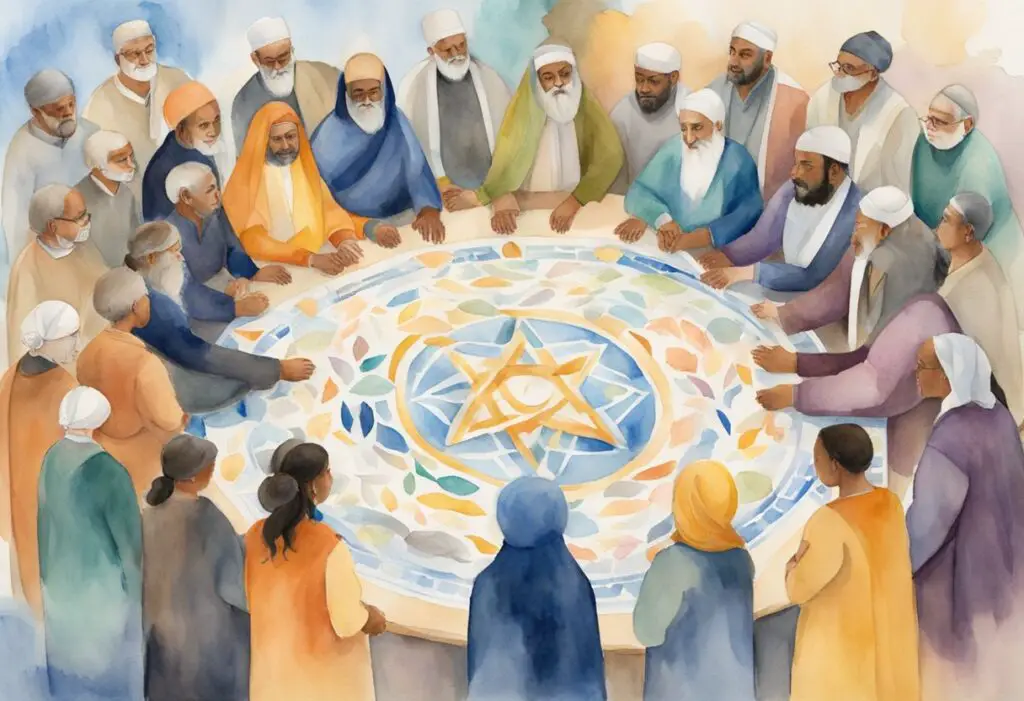Imagine a world where spirituality and social activism intertwine seamlessly. Spiritual activism is spirituality for social change, tapping into the deeper connections we share to foster a more compassionate and united world. This unique blend of inner growth and outward action offers you the tools to make impactful changes in society.

By embracing spiritual activism, you recognize that the path to social change begins within. When you find harmony and peace inside yourself, it’s natural to extend that compassion to others, sparking transformation not just in your life but in the communities around you. Engaged Buddhism is a profound example of this, emphasizing that our spiritual journey and social engagement are deeply connected.
You don’t have to look far to see the impact of spiritual activism. Whether drawing inspiration from thinkers like Gloria Anzaldúa or exploring the principles of Engaged Buddhism, the central message remains: your spirituality can be a powerful catalyst for social improvement, bringing unity and empathy to the forefront of societal change.
-

Celestial Soul Eco-Friendly Tote Bag
$18.50 Select options This product has multiple variants. The options may be chosen on the product page -

Celestial Soul Women’s T-Shirt
Price range: $20.00 through $21.50 Select options This product has multiple variants. The options may be chosen on the product page
The Essence of Spiritual Activism
Understanding spiritual activism involves exploring its definition, historical context, key influencers, and core principles. This concept combines spirituality and activism to inspire social change and foster a more compassionate world.
Defining Spiritual Activism
Spiritual activism merges the inner and outer aspects of change. It emphasizes interconnectedness, love, and truth while advocating for social justice. Rather than focusing solely on external actions, spiritual activism integrates internal spiritual practices such as mindfulness, meditation, and reflection into activism. This approach seeks to address issues like racism, sexism, and homophobia by fostering compassion and inner transformation as much as external efforts.
Historical Context and Influencers
Historical figures like Gloria Anzaldúa have shaped spiritual activism. Anzaldúa’s work often interconnected personal spiritual growth with public action, emphasizing the importance of both inner and outer work. Additionally, concepts like engaged spirituality and sacred activism have been pivotal. These frameworks highlight the necessity of incorporating spiritual principles into the pursuit of justice, suggesting that true transformation arises from a blend of spiritual and activist practices.
Principles of Spiritual Activism
Key principles of spiritual activism include love, interconnectedness, and truth. Practitioners believe that love should be the driving force behind actions, fostering compassion and understanding. Interconnectedness emphasizes the understanding that all beings are connected, which helps in recognizing the broader impact of individual actions. Truth involves speaking up against injustices while remaining grounded in moral and ethical integrity. These principles guide spiritual activists in their efforts to create meaningful and transformative social change.
By blending spirituality with activism, you can cultivate a deeper, more compassionate approach to social justice. The essence of spiritual activism lies in its ability to inspire individual and collective transformation, leading to a more interconnected and loving world.
The Interplay of Spirituality and Social Justice
Exploring the relationship between spirituality and social justice reveals how religious beliefs, ethical principles, and a commitment to compassion play crucial roles in advocating for equality and dismantling oppression. Spirituality can inspire social change and foster a more inclusive and compassionate world.
Religion, Ethics, and Social Movements
Religion often serves as a foundation for ethical values that drive social justice movements. Many spiritual traditions emphasize compassion, justice, and the dignity of all human beings. Figures like Martin Luther King Jr. drew on Christian principles to fight against racial injustice, illustrating how spiritual teachings can fuel activism.
Various faith-based organizations are dedicated to social causes, striving to create a fairer world. For example, liberation theology in Latin America connects Christian theology with political activism to address issues of poverty and oppression. Your spiritual beliefs can motivate you to engage in social justice work, advocating for marginalized communities and pushing for systemic change.
Overcoming Oppression with Compassion
Compassion lies at the heart of many spiritual traditions and serves as a powerful tool for overcoming oppression. By fostering empathy and understanding, spirituality encourages you to see the humanity in everyone, regardless of their racial label, nationality, or social status.
Compassionate actions, such as volunteering and advocating for social justice, help dismantle systemic barriers that affect BIPOC, Latinx, women of color, and other marginalized groups. Embracing a spiritual mindset can guide you in addressing social inequalities with a sense of unity and interdependence. Moving beyond individual goals to focus on collective well-being can lead to meaningful change in society.
Intersectionality and Activism
Intersectionality emphasizes understanding how various forms of oppression—such as race, gender, and class—intersect and impact individuals differently. Recognizing these overlapping identities is essential in spiritual activism. By acknowledging intersectionality, you can better advocate for comprehensive social justice that addresses the diverse experiences of marginalized groups.
Activism inspired by spirituality often seeks to include and uplift all voices, recognizing the unique challenges faced by different communities. Through intersectional activism, you can work towards a more equitable society, ensuring that initiatives are inclusive and address the needs of everyone, particularly those who are most vulnerable. Understanding the interplay of these factors can empower your activism and foster deeper connections within your community.
Rituals and Practices for Healing and Change

Rituals and spiritual practices can play a powerful role in fostering healing, driving social change, and cultivating a more compassionate world. From creating sacred spaces to engaging in contemplative activities, these practices can nourish your soul and fuel collective transformation.
Creating Sacred Spaces
Transforming a physical space into a sacred environment can enhance your spiritual growth and healing. You might begin by ensuring the space is clean and clutter-free. Add elements that resonate with you spiritually, such as candles, crystals, or incense.
Colors can also set the tone. Use lighter shades for peace or vibrant hues for energy. Personal artifacts like family photos or mementos can imbue the space with love and positive memories, reinforcing the sacred atmosphere.
Whether it’s a whole room or a small corner, a dedicated area for spiritual practices can promote mindfulness and self-care. Making this space feel special can deepen your connection to rituals and enhance their effectiveness in your life.
Rituals for Personal and Collective Transformation
Rituals can be a conduit for deep personal and collective change. Personal rituals might include morning affirmations, journaling, or meditative walks. Engaging in these activities regularly fosters a sense of purpose and mindfulness.
In a community setting, rituals such as group meditations, potlucks with a spiritual focus, or collective acts of service can create bonds. These events can fortify social activism, promoting a sense of unity and shared mission.
Creating consistent, meaningful rituals can empower you and your community, driving both personal growth and social action. Whether it’s lighting a candle for intention or participating in a communal ceremony, rituals serve as a bridge between the spiritual and the tangible world, fostering change.
Contemplative Activities and Insight
Contemplative activities like meditation, yoga, or prayer can offer profound insights into your life and the world around you. These practices encourage mindfulness and help you to center your thoughts, aiding in personal healing and growth.
Engaging in mindful activities daily, even if only for a few minutes, can shift your perspective. Practices such as mindful breathing or observing nature can help you connect more deeply with the present moment and reduce stress.
These activities not only nourish your soul but also provide clarity and direction for your actions. Insight gained from contemplative practices can inspire more compassionate interactions and thoughtful activism, leading to meaningful change in your community.
Challenges and Controversies in Spiritual Activism

Pursuing spiritual activism involves navigating complex cultural and social dynamics. Challenges such as avoiding spiritual bypassing and cultural appropriation, as well as addressing issues related to privilege and inequality, are critical.
Avoiding Spiritual Bypassing and Cultural Appropriation
Spiritual bypassing occurs when spirituality is used to avoid facing difficult emotions, such as fear and anger. This can undermine efforts towards genuine social change. If you ignore issues like white privilege or dismiss the struggles of the LGBTQQIA2sp+ community, the activism becomes superficial.
Cultural appropriation is another significant concern. Borrowing spiritual practices from marginalized cultures without permission or understanding can be disrespectful and harmful. It’s essential to approach these practices with respect and knowledge. Acknowledge their origins and consider the implications of their use.
To navigate these issues, educate yourself about the cultures and traditions you engage with. Seek guidance from community leaders who are the rightful custodians of these spiritual practices. This helps ensure that your activism is respectful and inclusive.
Understanding and addressing privilege, particularly white privilege, within spiritual activism is crucial. Being aware of your privileges can help you become a more effective and empathetic advocate. White fragility, or the defensiveness some white people exhibit when confronted with racial issues, can be a barrier to progress.
It’s also important to recognize how privilege intersects with aspects like economic status, gender, and sexual orientation. These intersections can create layered challenges that require nuanced approaches. Engage with diverse perspectives and listen actively to those who face different struggles.
Becoming conscious of inequality and privilege helps to foster a truly inclusive environment. This might involve confronting difficult truths and showing courage in the face of discomfort. By doing so, you strengthen the impact of your spiritual activism and contribute to meaningful social transformation.
The Future of Spiritual Activism

The future of spiritual activism lies in creating sustainable solutions and fostering global consciousness, while also building strong communities and engaging in peaceful activism. These elements are crucial for achieving meaningful and long-lasting social change.
Incorporating Sustainability and Global Consciousness
Spiritual activism is increasingly intertwined with the concept of sustainability and addressing climate change. By adopting a holistic worldview, you can emphasize the spiritual dimensions of caring for the Earth. This includes practices that reduce your carbon footprint, support renewable energy, and promote sustainable living.
Understanding the interconnectedness of life can guide you to make choices that protect the planet. For example, engaging in mindfulness and meditation can cultivate a deeper appreciation for nature and inspire actions that contribute to climate resilience. You can participate in local clean-up drives, support environmental policies, and advocate for ecological justice to ensure that sustainability becomes a key part of your spiritual journey.
Building Community and Engaging in Peaceful Activism
Creating and nurturing community is essential for spiritual activism. By fostering inclusivity and collaboration, you can build networks that support social change and collective well-being. Community engagement can take many forms, from organizing workshops and discussion groups to leading meditation circles and participating in local initiatives.
Peaceful activism rooted in compassion and love is a powerful tool for transformative change. You can join or create movements that advocate for equality, justice, and human rights. Engaging in non-violent protests, educational campaigns, and community outreach programs helps to raise awareness and inspire others. Your commitment to peaceful activism can serve as a beacon of hope, demonstrating that positive change is possible when driven by a united and spiritually conscious community.

